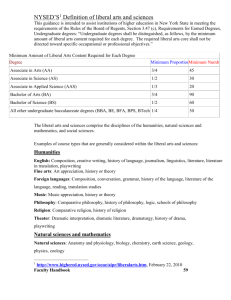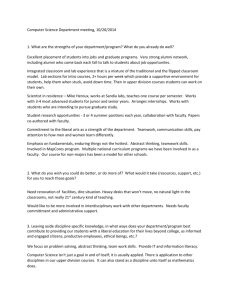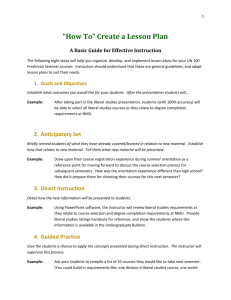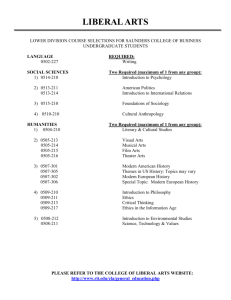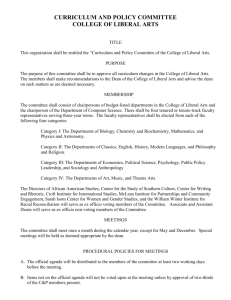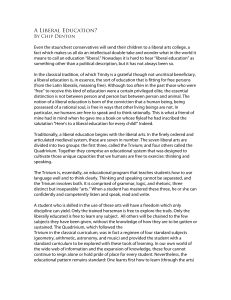Assumptions of a liberal
advertisement
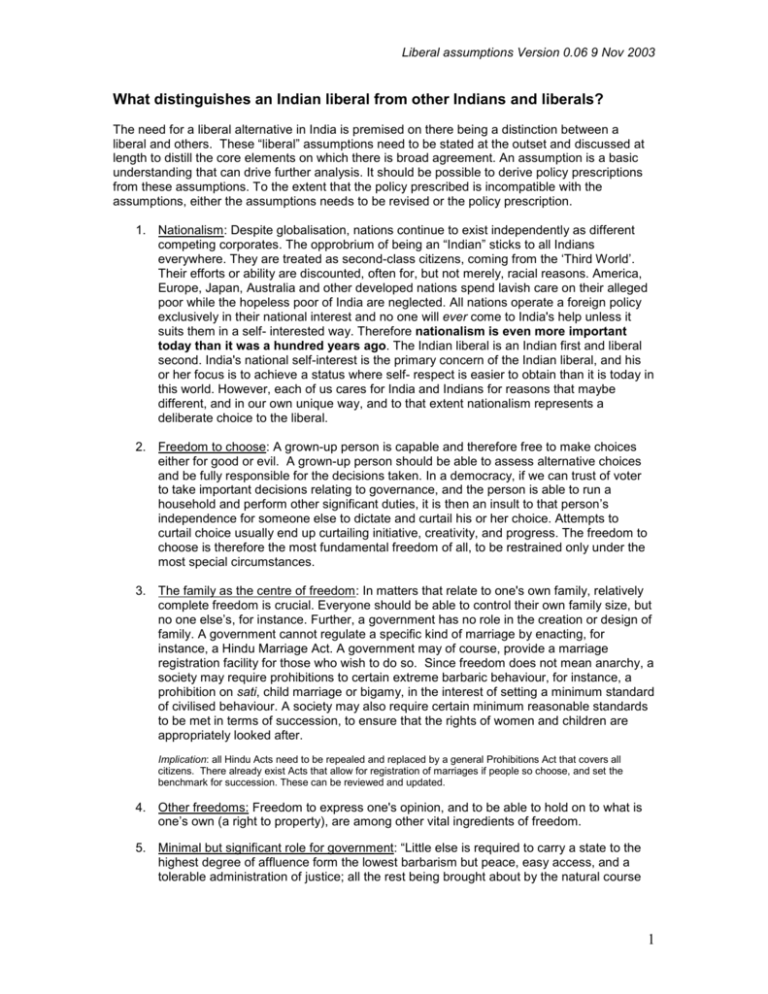
Liberal assumptions Version 0.06 9 Nov 2003 What distinguishes an Indian liberal from other Indians and liberals? The need for a liberal alternative in India is premised on there being a distinction between a liberal and others. These “liberal” assumptions need to be stated at the outset and discussed at length to distill the core elements on which there is broad agreement. An assumption is a basic understanding that can drive further analysis. It should be possible to derive policy prescriptions from these assumptions. To the extent that the policy prescribed is incompatible with the assumptions, either the assumptions needs to be revised or the policy prescription. 1. Nationalism: Despite globalisation, nations continue to exist independently as different competing corporates. The opprobrium of being an “Indian” sticks to all Indians everywhere. They are treated as second-class citizens, coming from the ‘Third World’. Their efforts or ability are discounted, often for, but not merely, racial reasons. America, Europe, Japan, Australia and other developed nations spend lavish care on their alleged poor while the hopeless poor of India are neglected. All nations operate a foreign policy exclusively in their national interest and no one will ever come to India's help unless it suits them in a self- interested way. Therefore nationalism is even more important today than it was a hundred years ago. The Indian liberal is an Indian first and liberal second. India's national self-interest is the primary concern of the Indian liberal, and his or her focus is to achieve a status where self- respect is easier to obtain than it is today in this world. However, each of us cares for India and Indians for reasons that maybe different, and in our own unique way, and to that extent nationalism represents a deliberate choice to the liberal. 2. Freedom to choose: A grown-up person is capable and therefore free to make choices either for good or evil. A grown-up person should be able to assess alternative choices and be fully responsible for the decisions taken. In a democracy, if we can trust of voter to take important decisions relating to governance, and the person is able to run a household and perform other significant duties, it is then an insult to that person’s independence for someone else to dictate and curtail his or her choice. Attempts to curtail choice usually end up curtailing initiative, creativity, and progress. The freedom to choose is therefore the most fundamental freedom of all, to be restrained only under the most special circumstances. 3. The family as the centre of freedom: In matters that relate to one's own family, relatively complete freedom is crucial. Everyone should be able to control their own family size, but no one else’s, for instance. Further, a government has no role in the creation or design of family. A government cannot regulate a specific kind of marriage by enacting, for instance, a Hindu Marriage Act. A government may of course, provide a marriage registration facility for those who wish to do so. Since freedom does not mean anarchy, a society may require prohibitions to certain extreme barbaric behaviour, for instance, a prohibition on sati, child marriage or bigamy, in the interest of setting a minimum standard of civilised behaviour. A society may also require certain minimum reasonable standards to be met in terms of succession, to ensure that the rights of women and children are appropriately looked after. Implication: all Hindu Acts need to be repealed and replaced by a general Prohibitions Act that covers all citizens. There already exist Acts that allow for registration of marriages if people so choose, and set the benchmark for succession. These can be reviewed and updated. 4. Other freedoms: Freedom to express one's opinion, and to be able to hold on to what is one’s own (a right to property), are among other vital ingredients of freedom. 5. Minimal but significant role for government: “Little else is required to carry a state to the highest degree of affluence form the lowest barbarism but peace, easy access, and a tolerable administration of justice; all the rest being brought about by the natural course 1 Liberal assumptions Version 0.06 9 Nov 2003 of things. All governments which thwart the natural course are unnatural, and, to support themselves, are obliged to be oppressive and tyrannical”. 6. Openness to constant change: Being open to inquiry and continuous questioning of existing assumptions is a core principle of a liberal. 7. Prosperity is preferable to poverty: This is a trite but important assumption that perhaps no alternative ideology including socialism would radically differ from. This assumption of a liberal, however, distinguishes a liberal from someone who may promote poverty as a virtue, or poverty as the only option for a country like India. 8. As much wealth as can be created should be allowed to be created: It is in the method of wealth creation, in terms of the organisation of the society and individual incentives that a liberal fundamentally differs from alternative ways of thinking. a. Economic system: Free and unfettered exchange of goods and services by private individuals, in the context of fair rules of exchange set and monitored or if absolutely necessary, enforced by a government, provides incentives that ensure the creation of the largest amount of wealth that can be created by a people given the state of knowledge. b. State of knowledge and education: Technology helps produces wealth: its foundation is science. Given that science is a part of the openness to new evidence that a liberal believes in, the liberal generally assumes that technology and science are useful tools. But strong support for these does not mean that the government directly needs to undertake such activity. 6. Large population can be good: It so happens that as a share of total wealth created, it is human endeavour rather than natural resource that is overwhelmingly predominant. As such, the human being is the ultimate resource. It follows that a population that is working to its highest ability in the environment of maximum opportunity will provide India as a whole with its best possible quality of life. 7. Open society: An open society is one that provides or allows the widest choice and opportunity. It encourages or at least tolerates dissent. a. Religious choice and tolerance: This is just one of the many kinds of choices, and therefore, an open society would allow the widest religious choice. In a country like India where religion remains and may remain a crucial part of life for many people for a long time to come, and leads to enormous differences in perception among its citizens, is can at times appear extremely difficult to reconcile religious choice and social cohesion. It is important that across the entire range of views, ranging from those who would have nothing to do with religion to its firmest believers, there has to be one single determining principle for ensuring social cohesion: tolerance. b. Political choice: It is an article of faith with liberalism that a well-run democracy is the best way to provide political choice to people. There can be alternative ways of providing this democratic choice. Whichever kind of democracy is chosen, it must not be prohibitively expensive for people who wish to offer the society the choice of certain non-violent solutions to the problems of society, to participate actively in this process. c. Cultural choice and preservation: In India, as a result of our diverse history, there are some relatively weak cultures that are easy for established ones to dominate. A laissez faire policy on such a matter may unfortunately mean that 2 Liberal assumptions Version 0.06 9 Nov 2003 elements that are inimical to modernisation may step in to fill the void. The most desired situation would be for civil society to provide adequate information to enable such cultures to make their own decisions with full awareness of the consequences. If such social institutions do not step in, there may be a role for government. d. Economic opportunity: Ownership of a reasonable set of economic resources is a crucial ingredient for participation in an open society. In consideration of various limitations that disadvantage some members of the society, the social system must allow the weakest citizen to own certain resources to participate in the open society. An alternative set 1. LIFE 2. LIBERTY 3. PROPERTY 4. GROUNDS AND PROCESSES 5. POLITICAL LIBERTY 6. ECONOMIC LIBERTY 7. COEXISTENCE WITH OTHER STATES the dignity of the individual, individual autonomy, sanctity of life individual liberty, a private sphere protected from outside interference (Humboldt and Mill) private property, self-propriety or self-ownership, exchange of property titles or contracts natural law and natural rights, Tom Paine's "imprescriptible rights" - Rights of Man (1791), rights anterior to govt, often exercised against state power utility, "the greatest happiness of the greatest number" (Bentham) idea of spontaneous order, evolved voluntary orders (Hayek) freedom of the press, freedom of speech, free expression limited representative government, power limited by means of a constitution and/or bill of rights rule of law, law applies equally to all (including agents of the state) religious toleration, extended to toleration of all unorthodox thought and (non injurious) behaviour the right of "exit", right of rebellion against unjust state, resistance to tyranny domestic free markets and international free trade complete freedom of movement of people and goods (laissez-faire, laissez-passer) private ownership of economic assets minimal taxes, balanced government budgets non-interference in the affairs of other nations international arbitration to solve disputes international free trade READINGS 1. Individuality and Privacy Wilhelm von Humboldt, The Limits of State Action, ed. J.W. Burrow (Cambridge University Press, 1969). John Stuart Mill, On Liberty, ed. Gertrude Himmelfarb (Harmondsworth: Penguin, 1984). David L. Norton, Personal Destinies: A Philosophy of Ethical Individualism (Princeton Universtiy Press, 1976). Steven Lukes, Individualism (New York: Harper and Row, 1973). 2. Tolerance and Moral Autonomy Herbert Spencer, Social Statics (New York: Robert Schalkenbach, 1970). Lysander Spooner, Vices are not Crimes: A Vindication of Moral Liberty (Cupertino: California: Tanstaafl, 1977). 3 Liberal assumptions Version 0.06 9 Nov 2003 Robert Nozick, Anarchy, State and Utopia (New York: Basic Books, 1974). Albert Jay Nock, "On Doing the Right Thing," in Our Enemy, the State, ed. Walter E. Grinder (New York: Free Life Editions, 1973). Immanuel Kant, Groundwork of a Metaphysic of Morals, ed. H.J. Paton (New York: Harper and Row, 1964). 3. Social Harmony, Free Trade and Peace Frédéric Bastiat, Economic Harmonies (Princeton, New Jersey: D. Van Nostrand, 1964). Richard Cobden, "Free Trade and Reduction of Armaments," Free Trade and Other Doctrines of the Manchester School, ed. Francis W. Hirst (New York: Augustus M. Kelley, 1968). Edmund Silberner, The Problem of war in Nineteenth Century Economic Thought, trans. Alexander H. Karppe (Princeton University Press, 1946). William Grahamn Sumner, "War" and "The Conquest of the United States by Spain," in War and Other Essays, ed. Albert G. Keller (New Haven: Yale University Press, 1911). Ludwig von Mises, The Free and Prosperous Commonwealth, trans. Ralph Raico (Princeton, New Jersey: Van Nostrand, 1962). 4


